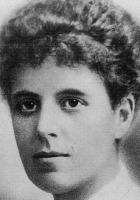Jenning Carmichael
Jenning Carmichael Poems
I THINK to-night I could bear it all,
Even the arrow that cleft the core,—
Could I wait again for your swift footfall,
And your sunny face coming in at the door.
...
DEAR old road, wheel-worn and broken,
Winding through the forest green,
Barred with shadows and with sunshine,
Misty vistas drawn between.
...
Jenning Carmichael Biography
Jennings Carmichael was an Australian poet. The daughter of Archibald Carmichael, Grace Elizabeth Jennings Carmichael was born at East Ballarat in 1868. She was educated at Melbourne, while still a child went to live on a station at Orbost, and grew up close to the bush she came to love so much. In 1888 she went to Melbourne to be trained as a nurse at the Royal Children's Hospital, Melbourne, and in 1891 published a small volume of prose sketches, Hospital Children. Having qualified she obtained a position on a station near Geelong, and subsequently married Francis Mullis. She contributed verse to the Australasian, and in 1895 Poems by Jennings Carmichael was published. She lived for a time in South Australia and then went to London, where she died in poor circumstances in 1904. In 1910 a small selection of her poems was published, in 1937 a plaque to her memory was unveiled at Orbost, and a year later a replica was placed in the public library at Ballarat. Two of Jennings Carmichael's sons were present at the ceremony. Jennings Carmichael wrote much good and pleasant verse with occasional touches of poetry. Brunton Stephens called Miss Carmichael the Jean Ingelow of Australia. Comparisons of this kind have little value, but it may be said that Miss Carmichael's position in relation to the leading Australian poets, is not dissimilar to that of Miss Ingelow in comparison with Robert Browning and Alfred Tennyson.)
The Best Poem Of Jenning Carmichael
A Woman's Mood
I THINK to-night I could bear it all,
Even the arrow that cleft the core,—
Could I wait again for your swift footfall,
And your sunny face coming in at the door.
With the old frank look and the gay young smile,
And the ring of the words you used to say;
I could almost deem the pain worth while,
To greet you again in the olden way!
But you stand without in the dark and cold,
And I may not open the long closed door,
Nor call thro’ the night, with the love of old,—
“Come into the warmth, as in nights of yore!”
I kneel alone in the red fire-glow,
And hear the wings of the wind sweep by;
You are out afar in the night, I know,
And the sough of the wind is like a cry.
You are out afar—and I wait within,
A grave-eyed woman whose pulse is slow;
The flames round the red coals softly spin,
And the lonely room’s in a rosy glow.
The firelight falls on your vacant chair,
And the soft brown rug where you used to stand;
Dear, never again shall I see you there,
Nor lift my head for your seeking hand.
Yet sometimes still, and in spite of all,
I wistful look at the fastened door,
And wait again for the swift footfall,
And the gay young voice as in hours of yore.
It still seems strange to be here alone,
With the rising sob of the wind without;
The sound takes a deep, insisting tone,
Where the trees are swinging their arms about.
Its moaning reaches the sheltered room,
And thrills my heart with a sense of pain;
I walk to the window, and pierce the gloom,
With a yearning look that is all in vain.
You are out in a night of depths that hold
No promise of dawning for you and me,
And only a ghost from the life of old
Has come from the world of memory!
You are out evermore! God wills it so!
But ah! my spirit is yearning yet!
As I kneel alone by the red fire-glow,
My eyes grow dim with the old regret.
O when shall the aching throb grow still,
The warm love-life turn cold at the core!
Must I be watching, against my will,
For your banished face in the opening door?
It may be, dear, when the sequel’s told
Of the story, read to its bitter close;
When the inner meanings of life unfold,
And the under-side of our being shows—
It may be then, in that truer light,
When all our knowledge has larger grown,
I may understand why you stray to-night,
And I am left, with the past, alone.
